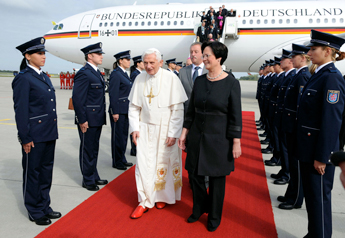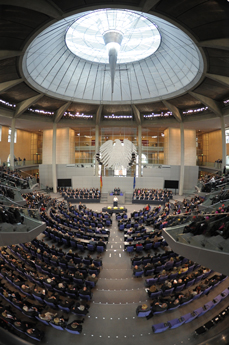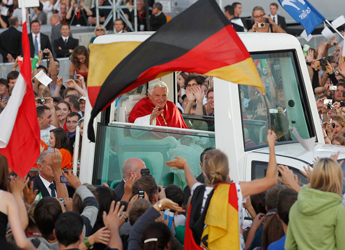by John Thavis

FREIBURG, Germany (CNS) – Pope Benedict XVI’s four-day visit to Germany highlighted two closely connected challenges for the Church: how to re-evangelize traditionally Christian countries in the West, and how to regain a credible voice in modern society.
In a sense, the pope’s German homeland was a test case for the “new evangelization” project that has taken center stage in his pontificate.
As the pope pointed out repeatedly during the Sept. 22-25 visit, modern Germany is a highly secularized country where atheism or religious indifference is widespread, where traditional moral values are eroding and where the Church’s message seems to have less and less impact.
And yet Germany has a native son as pope – still a point of pride for many Germans – and a tradition of intellectual debate. At the very least, the pope hoped for a fair hearing, and at some levels, he got one.
His address to the German parliament, in which he argued that social justice must be grounded in morality, prompted reflection and discussion in German media. The normally critical weekly Der Spiegel called the speech thought-provoking and “courageous.”
It was a classic Pope Benedict speech, a philosophical exposition that ranged from the biblical account of King Solomon to the positivist world view of modernity. He showed that he can connect with the intelligentsia, and at this rarified level he gets respect.
The pope also clearly connected with the Catholic faithful who turned out by the tens of thousands for his Masses and prayer services. Praying before a statue of Mary at a shrine in Etzelsbach or kneeling in eucharistic adoration at the Freiburg cathedral, the pope heard behind him the sound of silence – music to his ears, because it was a sign of intense participation.
His appeal to return to the Christian roots of Germany met with enthusiastic approval from what one woman called his “base” – the Catholic families who have tried to maintain their religious traditions in the face of decades of communism and more recent years of social fragmentation.

Other audiences appeared less in sync with the pope’s message and his single-minded focus on the “return to God” theme.
To Germans who have left the Church or those who have pushed for a “dialogue” within the Church on issues like priestly celibacy and the role of women and lay people, the pope had some pointed words.
First, he said the root problem was a misunderstanding of the nature of the Church: It’s not just a social organization that people opt in or out of, but a community of believers that belongs to Jesus Christ. He blamed internal dissatisfaction on Catholics’ superficial notions of a “dream Church” that has failed to materialize.
In a meeting in Freiburg with officials of Germany’s central lay Catholic committee, the pope bluntly described the German church as “superbly organized” but lacking in spirit. Rather than relying on big church structures and programs, he said, “new evangelization” will depend more on small Catholic communities and individuals able to share their faith experiences with co-workers, family and friends.
The pope’s visit was also designed to reach a wider audience, the millions of Germans who have drifted away from the Church or religion. At the trip’s first event at Berlin’s presidential palace, Cardinal Reinhard Marx of Munich told Catholic News Service that he was convinced these Germans would be listening to the pope – even the skeptics, he said.
The skeptics were not at the papal venues, however. They followed the visit through the media, if at all. And their reactions were mixed.
“His speech to parliament showed he is a man with high intellect. But for most people, it is too high. The talk about needing to rediscover God – this I didn’t understand. It sounds like what he’s saying belongs to the past,” said Magda Hilmers, a Protestant from Freiburg.

For Andres Capriles, a young Bolivian immigrant to Germany, the pope’s words were important but did not address what’s on many Catholics’ minds.
“People are not just disillusioned about God and religion, they are disillusioned about the Church and the direction it is moving, which seems to be away from the Second Vatican Council,” he said.
Petra Kollmar, a 57-year-old Catholic from Freiburg, said the problem with the pope’s visit was “what he did not talk about – the ‘no’ to women priests, the Church’s attitude toward homosexuals and divorced people in the Church, the abuse of children that has occurred.”
But the pope’s approach in Germany was not to make concessions. In Freiburg, he said that rather than launch a “new strategy,” the Church needs to “set aside its worldliness” and stop adapting itself to the standards of the secular society.
Faith lived fully is always counter-cultural, he said, but history has shown it’s the only way for the Church to regain credibility for its mission.
In Germany, the pope sees “new evangelization” as a long and uphill process that starts with a clearer understanding of its own nature and purpose, and not an attempt to find middle ground with critics.

In his 1970 book “Glaube und Zukunft” (“Faith and the Future”) written in the immediate post-Vatican II “renewal” period, stated:
“From today’s crisis, a Church will emerge tomorrow that will have lost a great deal. She will be small and, to a large extent, will have to start from the beginning …
“Her [the Church’s] real crisis has hardly started. We still have to go through some great storms …. Certainly she will never again be the dominant force in society to the degree that she was until recently.”
Part of the problem is the endorsement at Vatican II of the liberal pluralistic society. This is contrary to the Catholic social teaching of Pius XI’s “Quas Primas” encyclical and to Pius XII’s December 6, 1953 discourse “Ci Riesce”.
Unfortunately, Jacques Maritain’s “integral humanism” permeates the Vatican II policies of “ecumenism” and “religious liberty”.
Maritain prosposed a new Christendom, rooted in his philosophical pluralism, in order to find ways Christianity could inform political discourse and policy in a pluralistic society.
This new attitude on the part of the Vatican led to the demise of the concept of the Catholic State to point nowadays the once Catholic countries like Spain, Italy and some Latin American countries have for all intents and purposes become pluralistic liberal societies that have legalized gay marriage and abortion.
Insofar as Benedict XVI promotes the secular state, ecumenism, religious liberty against the traditional teaching of the Catholic Church, he is partly responsible for this situation that he complains about.